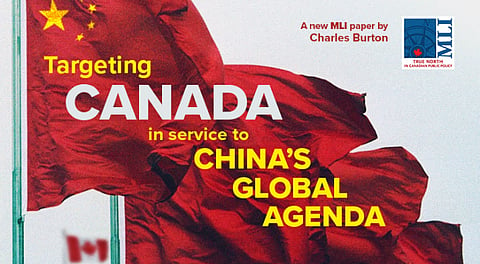

Indifference toward China’s corrosive effect on the global rules-based order has made Canada a laggard when it comes to protecting its institutions and citizens from Beijing’s transgressions, a Canadian think tank has alleged.
In his new paper, Targeting Canada in Service to China’s Global Agenda, Macdonald-Laurier Institute Senior Fellow Charles Burton documents the pervasive and corrosive nature of the People’s Republic of China’s (PRC) operations in Canada, drawing attention to China’s political influence in the form of elite capture, shaping Canadians’ information space and eroding Canadian democracy.
The web of PRC political influence unfolds within a larger geostrategic backdrop: Canada is a neighbour and strong ally to the US, the PRC’s geopolitical rival and a member of the Five Eyes intelligence alliance. It is also part of the G7 and plays a key role in North American continental defence.
Yet, Burton believes Canada's political leadership has downplayed the scale of the PRC’s extensive influence operations on Canadian soil, their implications for national security and the damage they do to our national institutions.
Burton says solutions lie in raising awareness to help strengthen Canadians’ resolve to resist Beijing’s influence operations and legislative measures to curb Chinese interference in Canada’s domestic politics.
“At present, there is a great deal of suspicion regarding PRC engagement with the Canadian elite,” writes Burton; noting, however, “[t]his has not become a determining factor in how Canadian people cast their votes.”
Burton argues the PRC’s strategy of elite capture in Canada aims to influence Canadian policymakers by emphasizing the economic benefits of Chinese investment and downplaying the regime’s human rights abuses and acts of aggression. Canada's status as a reliable source of raw materials makes it an attractive strategic target for the PRC.
The lure of investment dollars has thus far stopped Canada from passing strong legislation restricting the transfer of classified technologies to agents of a foreign state, as have the US and the UK. Even Canadian nationals who have been caught transferring sensitive technologies to the PRC have managed to evade prosecution.
Burton adds Beijing influences Canadian public perception on key issues by establishing close relationships with influencers in business, government and academia.
He says the PRC also targets ethnically Chinese Canadians and Chinese Canadian organizations, whether by appealing to their “responsibility to the motherland” or through associations serving as fronts for PRC “police stations” he says are involved in harassment operations against Canada-based critics of the regime.
Leaked classified intelligence assessments have revealed more of the extent of the PRC’s interference in Canadian elections. Burton says such leaks indicate the PRC has threatened the integrity of democratic institutions across the country and at all levels of government.
More positively, Burton argues public awareness of the PRC’s intentions has led to greater skepticism about selling sensitive Canadian assets to China. Beijing’s ability to translate elite capture into geostrategic influence in Canada via large-scale investments in Canadian natural resources and infrastructure has been limited.
However, Burton warns this could easily change, as Canada’s distinctive parliamentary system, which concentrates power in the Office of the Prime Minister, makes it highly vulnerable to the machinations of foreign lobbies.
“At present, there is a great deal of suspicion regarding PRC engagement with the Canadian elite, but this has not become a determining factor in how Canadian people cast their votes,” concludes Burton.
“Communicating that this is of urgent concern for Canadian democracy is a critical issue for Canada.”
Burton is also a senior fellow of the European Values Center for Security Policy in Prague, and a former diplomat at Canada’s embassy in Beijing.
